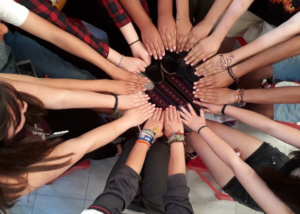Ana Maria Eyng, Professor and researcher within the Graduate Program in Education, Pontifícia Universidade Católica do Paraná (PUCPR), Curitiba, PR, Brazil.

Image: personal archive of Ana Maria Eyng, 2017.
The article “Children’s rights in contexts of humanitarian needs: risk factors and educational demands”, published in the journal Ensaio: Avaliação e Políticas Públicas em Educação (vol. 28, no. 109), discusses the risks that surround the rights of children in daily life crossed by multifactorial violence, creating a humanitarian situation. The discussion analyses research data on children in the Americas, as a result of a partnership between an international interstate organization, the Inter-American Children’s Institute (IIN), which belongs to the Organization of American States (OAS), specializing in children and adolescents, a civil society organization, the Marist International Solidarity Foundation (FMSI), present in several countries in the world and in the region, and a research team from the university, namely the Graduate Program in Education (PPGE) of the Pontifícia Universidade Católica do Parana (PUCPR). The research was motivated by the need for programs to guarantee rights for the prevention and eradication of violence in daily spaces, through a greater inclusion of children and adolescents in political and educational processes.
Listening to those who are the protagonists of daily childhood experiences allow them to reflect on the contexts of extreme poverty. The subjects were heard through interviews, with the participation of 301 people, being 131 children participating in the programs, 94 family members of these children and 76 professionals from the programs. From the participants’ perceptions, the text highlights the risk factors they identify in their daily lives. The testimonies illustrate oppressive threats to poor children in the geopolitical and economic peripheries of large cities. The responses of the interviewees were grouped, systematized and discussed along the article, covering eleven categories that synthesize the subjects’ statements about the risk factors related to: 1. Family, 2. Community, 3. Public policy, 4. Economy, 5. Education, 6. Culture, 7. Health, 8. (In) security, 9. Crime, 10. Identity and 11. Violation of rights. The subjects’ positions focus on cultural discourses of meritocracy and responsibility, making them consider themselves as the main protagonists of violence that hamper their daily lives.
It is important to emphasize that the set of risk factors operate discourses of traditional pedagogies, still very evident in school representations and practices, reinforced in recent decades by the application of neoliberal logics to education. In particular, in evaluation policies, and consequently in institutional and school curricula. The expectation of overcoming or minimizing these risk factors demands the construction of child protection factors and the strengthening of each child as a subject of rights. This direction “supposes the need for new learning processes, preceded by the deconstruction of concepts and practices already internalized in the daily spaces of children. It implies, therefore, unlearning violence, discrimination, disrespect, the culture of being assisted, the facto f putting the guild on the victim, as well as subordination and disqualification of the child. And, as a consequence, to learn new individual and collective strategies that allow the restarting the life projects of each child for a less unjust present and a future with more equity” (EYNG, 2019, p. 53).
Finally, the demands arising from the contexts described in the text are many and complex, and therefore require intersectoral educational policies and actions, capable of establishing dialogues that gradually attenuate the risk factors having an impact on childhood. As an alternative, what is expected is a Project of society, in which the formulation and development of new strategies for social justice are possible, especially in the field of education.
Watch the following video, where Ana Maria Eyng presents the other results of this study.
References
EYNG, A. M. (Org). Infâncias e violências: garantia de direitos no cotidiano de crianças e adolescentes. Contribuições de programas desenvolvidos na órbita estatal e da sociedade civil no âmbito internacional. Curitiba: PUCPRESS, 2019. Available from: https://www.champagnat.org/shared/bau/Infancias_e_violencias_Relatorio2018.pdf
To read the article, acess
EYNG, A. M. et al. Direitos da infância em contextos de necessidades humanitárias: fatores de risco e demandas educativas. Ensaio: aval.pol.públ.Educ. [online]. 2020, vol. 28, no. 109, pp.1098-1120, ISSN 1809-4465 [viewed 03 November 2020]. https://doi.org/10.1590/s0104-40362020002802361.Available from: http://ref.scielo.org/s7fpgb
External links
Blog Ensaio: https://rensaio.wordpress.com/
Ensaio: Avaliação e Políticas Públicas em Educação – ENSAIO: www.scielo.br/ensaio
Facebook Ensaio: https://www.facebook.com/ensaiorevista/
Infância e Violência: O desafio de garantir direitos nos contextos cotidianos da crianças http://iin.oea.org/pdf-iin/publicaciones/2019/Ni%C3%B1ezyViolencias-Por.pdf
Infâncias E Violências Garantia De Direitos No Cotidiano De Crianças E Adolescentes: http://www.champagnat.org/shared/bau/Infancias_e_violencias_Relatorio2018.pdf
Políticas Públicas, Direitos Humanos e Formação de Professores – Grupo de Pesquisa: https://www.plataformahumanitaria.org/
Twitter Ensaio: https://twitter.com/revista_ensaio
Como citar este post [ISO 690/2010]:












Recent Comments